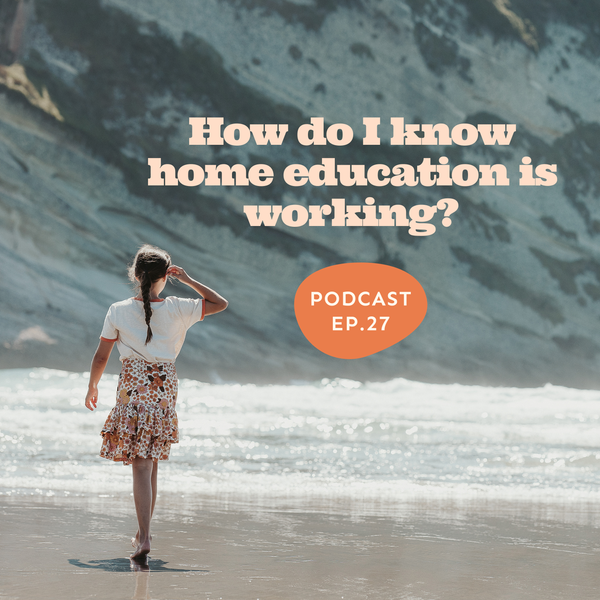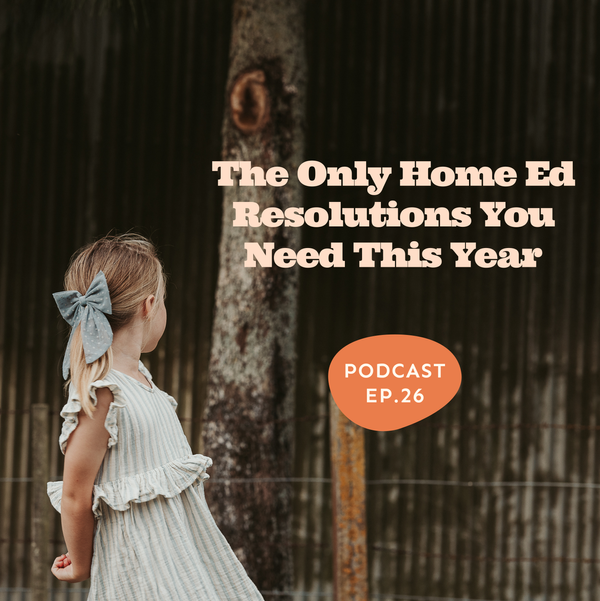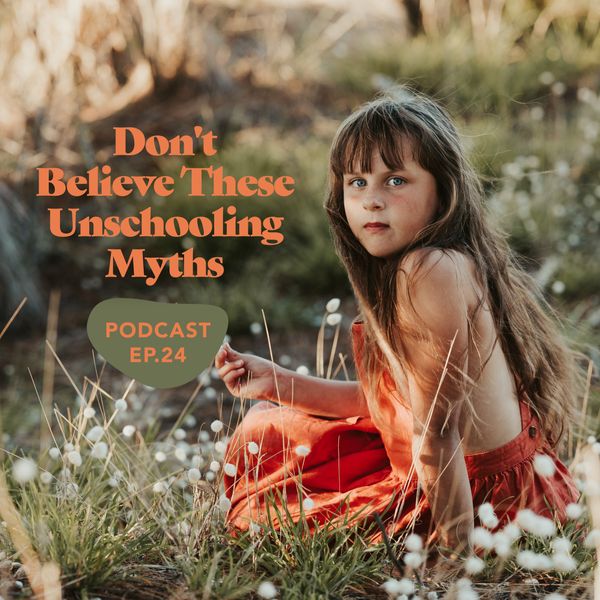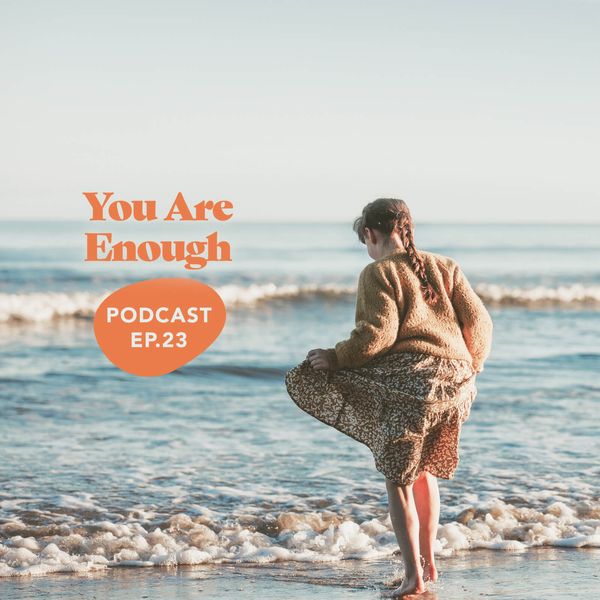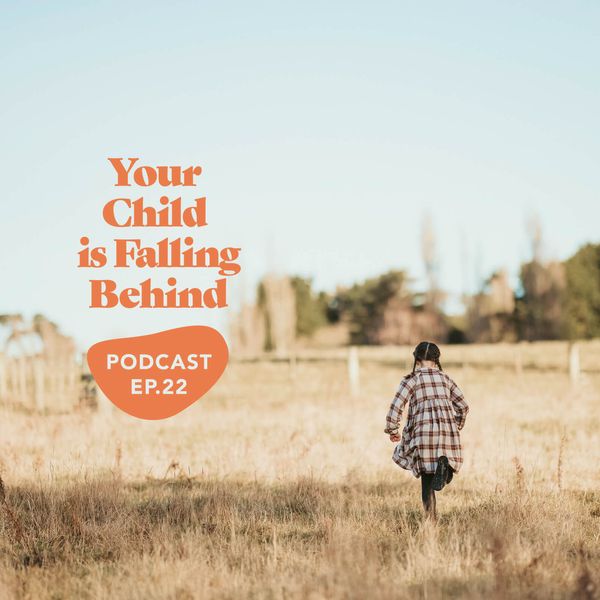Welcome back to another question and answer episode, where we take questions from the home education community and chat our way though them. I really love working through this episode each month, because your questions always reflect the struggles, the worries, and the hopes and dreams, of so many of us. A big thank you to Amy, Jacqui and Kate for taking the time to send in their recordings so we can hear, directly, from this wonderful community.
In this episode we talk about:
- How to avoid comparing our children to others – especially those who go to school.
- How to navigate slower educational seasons of life when we don’t feel we’re doing enough.
- How to explain home schooling and unschooling to our children, as we move away from the school system.
These private episodes go even deeper, backed by research, the science of how children learn and grow, and more than a decade of lived home educating experience. Each one is designed to help you rethink, reframe, and recalibrate the way you're walking this path, giving you the confidence to live the version of life you want. The Collection is 23 episodes strong and counting, with over 10 hours of listening available right now.
As a subscriber, you'll also get immediate access to my self-paced course, expert-led masterclasses recordings, five downloadable guides, our school exemption documents, and more 💛
Show Notes
Simon Sinek – Start With Why. This is a business oriented book, but at its core is a super powerful idea… that you want to anchor whatever you’re doing with WHY you’re doing it. Why are you home educating in the first place? Why is it important to your children and their development? Why is it important to you and your family? If you can speak to the why, it’s much easier for the other questions, the whats and the hows, to all fall into place. Regardless of the ups and downs of the overall experience and the particulars of any given approach, you will always come back to the why.
This book is such a joy, and an absolute classic of kids’ literature: Eric Carle – The Very Hungry Caterpillar. All our children have loved it! It makes me smile, even just thinking about it.
I recommend you check out Skillshare – an online learning community with thousands of classes on a whole stack of cool, creative things – like illustration, design, photography, videography, writing, animation, crafting…there are so many courses there, put together by super interesting and passionate people. High quality stuff that I think your children will love!
Complete Transcript
Helloooo and welcome to the Life Without School podcast, here to help you and your children live the life you want to, not just the one you’re told you should.
I’m Issy, a writer and home educating dad from New Zealand.
You can find my work at starkravingdadblog.com – all of my posts, podcast episodes, and short films created to encourage, support and reassure anyone walking this road less travelled.
Thank you so much for tuning in to listen today. Alright, let’s get into this week’s episode.
INTRO
Hello there, welcome back to another question and answer episode – where I take some time to dig into specific things you’ve asked me to talk more about.
I really love working through this episode each month, because your questions always reflect the struggles, the worries, and the hopes and dreams, of so many of us.
We really are all facing the same challenges here. We really are in this together.
Today, I’m talking through three questions. We’ll hear from the actual people who asked these questions as we go, but they cover the topics of comparing our home educated children with others who go to school, quieter seasons of life where it feels like not much is happening, and the pressure that can come with that, and then we’ll finish with a question around explaining what home education actually is to our children, how it’s different, and why that’s important.
Again, just like all of these Q&A chats, the things that sit under these questions deserve full episodes sometime. But let’s make a start today. A start that – I always want to remind you – will be based purely on my own experiences, opinions, life circumstances, and worldviews. Nothing is ever black and white, so please don’t take my answers to these questions as being right. Or, claimed truth. They are just my thoughts. But, as always, I can promise you that those thoughts will be careful, considered, and caring.
Ok, with that said, we have some super interesting topics to dig into today. So, let’s go.
MUSIC
Question One:
“Hi Issy, thank you for your podcast, I’m really enjoying listening to it. My name is Amy. I’m from the UK, and I have two boys aged 7 and 5 who’ve never been to school. My question is: how do you avoid comparing your children with schooled children of a similar age? Particularly, avoiding worrying about those areas where your children don’t seem to be in line with schooled children? Thank you!”
Theodore Roosevelt famously said – “Comparison is the thief of joy.”
But I would go further. Comparing ourselves to others robs us of the chance to live a life that is authentic to who we are. It is impossible to live a life that truly respects that if we benchmark who we are against other people’s lives, external standards and progress measures.
But, we’re human. It’s almost impossible not to let comparison impact our lives from time to time. It creeps in, it gets under our skin, and it nags away at the back of our minds.
But like anything when it comes to the human brain, it can be worked in. It can be re-wired, and re-directed, and harnessed in more positive ways.
With anything like this, we need to start right at the heart of the problem. If we compare our child with another, and it causes us to worry that our child is not able to do something they should be able to, or achieve at a level they should, what’s the actual problem there?
Well, it’s not that the 10 year old child standing in front of your 10 year old child is able to solve a quick-fire mathematical problem on the spot when yours can’t. The problem is that we’ve decided it’s important that every 10 year old child on the planet can solve it. Regardless of who they are, what their strengths are, what they’re interested in, what their goals are, and what their experiences in life so far have been.
Nothing matters other than that they’re 10. And because they’re 10, there is a clear list of academic things they should be able to do.
Let me take you through a hypothetical situation:
You get talking to a family who has a child the same age as yours. You hear how they’ve just returned from a skiing trip, where their daughter carved up the mountain for three days. They show us a little video. It’s genuinely impressive.
But your child has zero interest at all in skiing, so…generally…you respect that situation for what it is. You think it’s pretty cool that their daughter is a competent skier as a 10 year old, but you’re not going to lie awake at night worrying that your child isn’t.
But if we play that same scenario, replacing skiing for maths, or spelling, watch out brain. And watch out sleep.
As a society, we haven’t set benchmarks for almost every child on the planet in the activity of skiing. And, we’d think it was odd if we did.
But we have for spelling. And we have for maths. And because that’s the way things have been done for some time now, we don’t think it’s odd. But it actually is.
So this – if we want to re-wire and re-direct our brains in ways that are more useful to us in these comparison scenarios – is where we have to start.
If we believe the benchmarks and measures society says are most important actually are, we will never stop our subconscious from comparing our children’s lives against them.
But if we examine them, and question them, and truly reflect on whether they are as important as we might think, we can reduce the strength of the hold they have on us. And eventually, we can shake that hold completely.
If you’ve heard episode five of this podcast – the one where I help you talk to your family and friends about your decision to home educate – I tell a little story about a neighbourhood of houses that are all painted the same colour – yellow. And how you, having chosen to live life differently, have painted yours blue.
Why have you painted it blue? Well, because that’s the colour your family loves. You look at it every day, and smile. If you wanted yellow, you would have painted it yellow.
When your child can’t multiply fractions on the spot, and another child their age can, do you feel that comparison pain because you believe, deeply, that every child of that age should be able to do that? And that you wished, deeply, that your child could? Because if you do, then you need to adjust life to start making that happen. You need to get the yellow paint back out.
The stronger you are in your convictions – the deeper you believe in the direction you are guiding your family’s life in – the less negative and confronting those comparisons will feel. The more you will be able to look at them objectively, without letting that social emotion grab you. The more you will see them for what they are – two completely different life paradigms that simply can’t – and shouldn’t – be compared.
Picture the Olympics. Four athletes are standing in a group, talking. There’s a runner, and a gymnast, and a swimmer, and a weight lifter. Does the runner compare themselves to the gymnast? Does the weight lifter benchmark their progress on their ability to butterfly and freestyle lengths of a pool as fast as the swimmer?
If they did – what would happen?
Well, they wouldn’t be at the Olympics, that’s for sure. Spreading their focus across too many things – things that aren’t actually important to them, or that they’re actually good at – would take time and energy away from things they have natural tendencies towards. Abilities and interest in.
They are at this level – the most elite athletic environment on the planet – because they have focused hard on their lane. They have focused hard on what they are good at.
For at least another generation, we’re going to be stuck with the prevailing benchmarks, expectations and – yes – the comparisons that come with them.
But as home educating parents, we’ve chosen to walk away from the system that promotes these things. We’ve decided that the very essence of childhood is crying out to be redefined, that those globally standard expectations *are* quite odd, and that it is important to help ignite the fire of change so that future generations will not be bound by them.
But we will only do that if we keep taking the wind out of those comparisons, and living a version of life that is as true to us, and our children, as we possibly can.
So together, let’s remember: the measures are irrelevant. The comparisons are meaningless. Age should not define an academic standard, or almost any standard. Other people should never define our personal goals and markers of progress. The achievements of one child should never be expected from another. Because every child is unique. Every child has their own dreams. Every child deserves the right to be respected for who they are.
And you – you are the change.
SPONSOR
Just before we move onto the second question for today, I want to talk about a website called Skillshare. They’re not sponsoring me here, by the way – I just want to quickly share what their learning platform is all about, because it’s found its way into becoming part of almost every day in our home. And, there’s a good chance it’ll be useful at some stage in your home too, especially if you have kids who want to explore creative things.
Skillshare is an online learning community with thousands of classes on a whole stack of cool, creative things – like illustration, design, photography, videography, writing, animation, crafting…there are so many courses there, put together by super interesting and passionate people. I’m looking at a framed picture above my desk that came out of one of my son’s Skillshare sessions – it’s this beautifully intricate pen drawing of a flower – I don’t know what kind of flower it is – wait, actually, I do, he’s written in down in the corner there…it’s a wolf’s bane…which I’ve never heard it, but it’s lovely, and it was part of a deep dive he did into that style of illustration after stumbling on some lessons about it. I talked in the last episode, the one on being your child’s coach, about finding people whose experience and skills your child can lean on, and we’re finding Skillshare a GREAT place to expand the network of people our kids have access to, and can tap into.
If you do want to check it out, I’ll leave a link in the show notes – and it would be amazing if you could sign up directly from that, because Skillshare will pass on a small payment to me for recommending them. And that, in turn, will help support the running of this podcast. The show notes are on my website, under this episode, or you can just go directly to this web address: skillshare.eqcm.net/Stark
But either way, you should totally check out Skillshare, because it’s awesome.
/SPONSOR SLOT
Question Two:
“Hi Issy, my name’s Jacqui, I’m calling from Wakefield in the UK. My question is how can we be kind and gentle with ourselves when we’re going through a season of our unschooling journeys where nothing much at all seems to be happening and we’re stuck in a rut. So, in my case, I’ve recently gone through a breakup, a separation, and the grief around that has been pretty all-consuming lately, and we’ve had quite a deep, dark winter, really, of drifting through our days, and being quite reliant on screens, and nothing much seems to be happening in terms of education. Of course, I know in my mind that I’ve probably just got more de-schooling to do around this but it’s quite hard to let go of that idea that you’re not doing enough in this time. Any insight and inspiration around this would be much appreciated. Thank you.”
Firstly, I just want to say kia kaha, Jacqui. It’s a Maori word that means to be strong, stay strong, to keep going.
It always amazes me that, even when life veers onto a path that suddenly becomes difficult and challenging, we don’t feel we can take our attention off the progress we should be making to really focus on what’s right in front of us. It amazes me, but it never surprises me. Because I have lived those sorts of life seasons – with a life-long illness that strikes quite aggressively from time to time – and I have felt those exact tensions. I need to slow down, and to rest, and to take care of my body and my mind, but…how can we possibly do that? There are things to do, there is progress to be made!
Even after many years of deconditioning myself from that, the pressure still tries to bubble up when I get sick, even now. And this, to me, is an unacceptable by-product of the way we have structured and embedded formal education into society over the last 100 years or so. We have ingrained this idea that progress is more important than anything else. That if we don’t keep moving forward, at the right pace, we will fall behind.
I’m really feeling for you Jacqui, and I think you’re speaking for a lot of people today, because there are so many life situations that lead to a need to slow down, to be present, to process. But how many of us actually find a way to shake the conditioning behind us that screams not to. That bangs away in the back of our already overwhelmed brains, saying “Come on, get on with it, you’re not being productive enough.”
It is shocking that, almost globally, we find ourselves in this place. Because life is not something we are trying to work our way towards, pushing everything else aside to try and get there. Life is now. This day, this moment, right now.
Yes, of course it’s important to think about the future. To plan, and to prepare, and to develop. But if we focus so much on some end goal that we sacrifice our ability to be present, and to respect the needs of life as they stand today…then, what’s the point?
I spoke in my last episode about the idea that education is not something separate to a child. It is something we draw out of them. Well, these sorts of life seasons are a time to really lean into that idea. Forget about the external stuff. Forget about any idea of taking information, or knowledge, or skills and putting them into your child’s brain. Instead, embrace the fact that this will be a time of internal growth for them.
And as you, together, chart a new life course out of and beyond this experience, they will discover new strength, and empathy and compassion. They will find new ways to express themselves. They will develop, with your help and guidance, new coping mechanisms, emotional outlets, and layers of resilience.
That is the season of learning and growth that you are in, and nothing much else needs to matter.
It makes me think of that wonderful children’s book The Very Hungry Caterpillar. The tiny caterpillar starts by eating everything in sight. It’s relentless in its search, and in its activity. But that, alone, is not what turns that caterpillar into a beautiful butterfly. That doesn’t happen until it has respected the need for a quieter period. A period of time where there is less activity, seemingly, but where a lot of change and transformational growth happens. Without its time in the cocoon, it wouldn’t have mattered how much activity had come before. There would be no butterfly.
So, my advice to you Jacqui, is to keep drifting through your days in whatever way you need. Because while it might not feel like you’re making any progress, and like you’re treading water a bit, you’re not. You and your children are growing in ways you never have before, and whatever you need to do to respect the period of time where that’s happening…lean into it. Embrace it. This is life, right now.
And while you and your children are in your cocoon, know that spring will come. Kia kaha, and I hope the days become brighter for you all – in every way – very soon.
MUSIC
Question Three:
“Hi, my name is Kate, from Nevada in the United States. I’m wondering about how to explain unschooling to our kids. We’ve scratched the surface, but I don’t feel like they quite get it, and if I were one of them I probably wouldn’t either. It’s so unfamiliar. We homeschooled last year but in preparation to return to public school. Now that we’ve caught the bug, and made this decision to continue the journey on our own terms, it’s going to look different. We’re not sure how to present this news to the kids. Some days it feels like we should just move forward, let things unfold, no explanations. After all, we aren’t sure yet how it’s going to look…but, sharing with them our purpose, our why, seems pretty important too.”
I like this question a lot, Kate, because it’s a reminder that this path through life really is the road less travelled. When you go to school, the map is very clear. Every step you need to take is laid out, down to the smallest detail. There are very few times on that journey where you would feel lost, or unsure. It’s a very well-worn path, and if you don’t veer from it – a lot of decisions in life will just be made for you. And for your children. The wide, known trail stretches out reassuringly in front of you.
But when you choose to leave that path, you’re suddenly faced with decision after decision. There are hints of trails running through the forest ahead of you, but you’ll continually be presented with the need to make new choices. It can be as daunting as it is empowering. But ultimately, the opportunity to draw up our own map through life is a pretty exciting one. And this spot right here, that Kate and her family find themselves standing in, is the start of that. Behind them, the well-worn and comfortable path they’ve started to walk away from. Ahead, the exciting unknown.
I also like this question for another reason – when a child goes to school, they are told what their life – more or less – is about to look like. It is not a two-way discussion. We do not ask for their contribution to what their days and weeks will look like, and how and in what they might invest their time. We simply tell them, and then our role as parents is about helping them find acceptance of the choices that have been made on their behalf.
But when we choose this different version of life, we suddenly have an opportunity to involve our children in what it will look like – for them, and us, as a team. It becomes a discussion. It’s a profoundly different way of experiencing childhood, and – I think – one of the most important aspects of the whole idea of living a life without school.
If you just replicate everything you see in a classroom, or in a school environment – which is often what our brains want us to do, to keep that aspect of familiarity on our new path – then you will also bring in the tendency to make decisions on your children’s behalf instead of involving them in the direction the whole thing will take. You will bring in the tendency to lay the map out in front of them, and tell them that this is more or less the journey they will be going on.
And this is where I’ll pick up my thoughts on your question, Kate. Because I think you’re absolutely right when you say it’s important to discuss your why with them. To bring them in on the mission you’re setting out on together.
I’ve talked before about my time in the tech startup world. I’ve actually taken a lot of what I learned through my experiences in that space and applied them to my home educating role. I looked after teams of people for many years, and there were a few key things I built my leadership approach on, but there were two main ones that always sat underneath everything else.
The first of those was making sure everyone always understood why we were doing what we were doing.
And the second of those was making sure they understood that how we did what we were trying to do was not just up to me. I would not be handing them a map with very specific, clearly defined directions. We, as a team, would decide the best path to get to the places we wanted to go. And then we would all contribute, in our own ways, to helping us get there. If someone had a suggestion for how we could do things better, the team would welcome it. And if it didn’t work out, that was fine.
But the point is that before you get to that how – before you start drawing any real detail onto your map – you must make sure everyone heading out on that journey understands why they’re on it.
There’s a great book by Simon Sinek, called Start With Why – I think I mentioned it in an episode way back. It’s a book that’s angled towards the business space, but it’s a concept that applies to any area of life. The power of knowing why you’re doing whatever it is you’re doing, long before you ever try and think about the how, or the what.
So let’s apply this idea to home education. Typically, a lot of headspace goes into what curriculums and resources to use. A lot of headspace goes into what a study area will look like, how it will be set up, and when we’ll be using it. A lot of headspace goes into how a day will be scheduled or what progress will be tracked.
A lot of headspace goes into the whats, and the hows, and the whens. And, so, those tend to be the things we talk to our children about. We share with them the schedule they’ll be following, and the resources they’ll be using, and where they’ll do their work. And, maybe we involve them in helping us decide what all that will look like.
But if we don’t first start with why we’re doing everything we’re doing there, and if we don’t involve our children at least to the point of understanding that, then we will build a life environment that they’re not really bought into. The more of a say you have in the mission you’re on, and the more you get to contribute to what that will look like as you go along, the more invested you will be in making it work. In leaning into it. And, the more of a north star you will have when the going gets tough. Because, when you’re carving your own path through life, it will.
So Kate, my advice to you – and to alllll the other parents out there who are standing near the start of this journey – is to get an open discussion going with your children about why you have decided it’s important to walk your own path. A discussion that invites their input into that why. A discussion that evolves into how you will set out on this journey, what it might look like along the way, and when you might need to adjust or tweak your direction or approach. You will find that the layers of detail you put on top of all that – and, how you’ll talk about those layers with your children – will follow quite naturally.
Now, obviously, how you approach this discussion is going to look different depending on how old your children are. The depth of the conversation you can have on this with a 6 year old is going to be different to the one you can have with a 13 year old. But the underlying message will be the same:
We, as parents, have chosen a different path for our family. But we want to walk it together, and we want you to help us – in lots of different ways – along the way.
This is why we have made this decision – insert your personal why here, obviously. And this is why, as parents, we believe this decision is right, and important, and good for us as a family. And this is what we hope we will all get out of life by living it this way. But we want you to tell us what you think, and to help us shape what that right and important looks like as we go along. We want you to tell us how you might do things, what you might do, and when you might do them, to make all these good and important things we’re talking about happen for you.
In my startup leadership roles, keeping things as organic, and as malleable as possible was always important. Making sure everyone always felt completely comfortable putting up their hand if the way we were approaching our next challenge or phase didn’t feel quite right. If it wasn’t going to get the best out of us as a team. If it, ultimately, wasn’t going to be the best, most respectful day-to-day manifestation of our why.
I truly believe that creating an environment like this is the most empowering thing you can do for your child. And, I believe it’s important that they understand, as early as possible, that they’ll have that level of input in the mission.
As parents, you have the clearest view of your family’s life context. You are across all the many nuances of life that your children won’t, and can’t understand yet. So you should absolutely set the starting point, and the guidelines, for how you’ll be approaching life. And, continue to guide it. But when you involve a child, when you share that mission with them, that ‘why’ with them, and help them grow their understanding of it, and input into it, more and more as the years go by…then you, as a family, will always be living the most authentic version of your life. That north star will always be there for you to course-correct towards whenever the details on the map get a little blurry.
And, it will always be there for your children, too. Not just in childhood, but throughout their lives. Because when you show them that life should always be lived according to the meaning you’re trying to take from it, and to give to it, you will build a level of self-awareness, self-respect, and confidence that will stay with them forever.
What a privilege it is to offer that gift.
CLOSING MUSIC
Three really interesting questions, there, that I think a lot of us face on this path. So, a big thank you to Amy, Jacqui and Kate for sending those in.
My biggest takeaway from all of the conversations today – from those nagging comparisons, to slower life seasons, to trying to explain to our children what life is going to look like on this path – is that there is a lot of work to be done to weaken the power the status quo holds over us. The expectations that come with life are so clear, and so strong, that even when we choose a different path they follow us.
Children should all learn the same things, at the same age. They should not slow down, or they’ll fall behind. And this, right here, is what their days should look like so we can ensure they don’t.
But the thing we must keep reminding ourselves is that the way things have been done is not the way we must do them. And the pressures and expectations that come with that normal, well-worn path through life, do not need to accompany us to the place we’ve charted our new course for.
We will, for some time yet, have them try and tag along. But the deeper we go on our personal journeys, the less they will be comfortable there. The less strength they will have. And, the more free we will be.
So, keep going.
Ok, let’s call it there today. Thank you so much for listening, and I’ll see you back here soon.
Bye for now.



